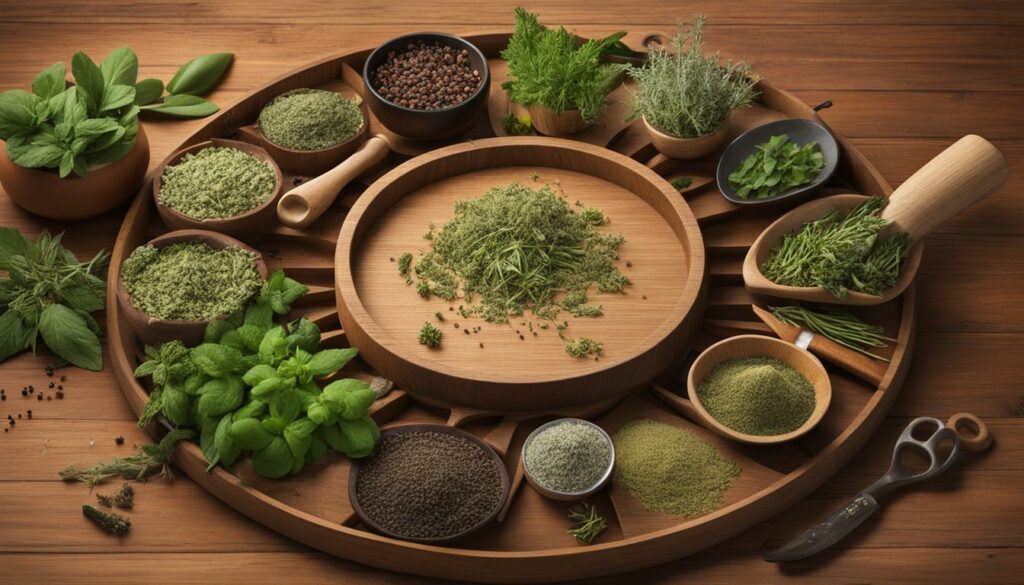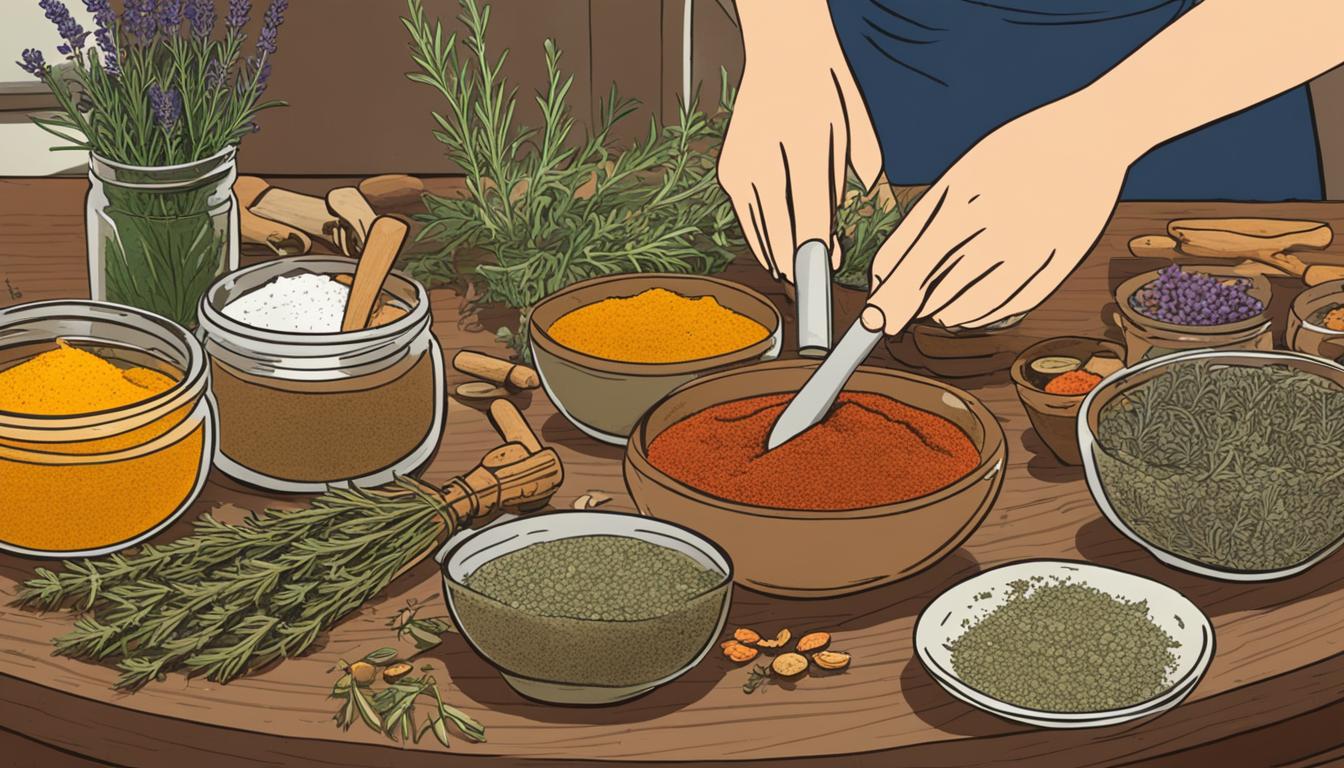Welcome to the Beginner’s Guide to Herbalism! If you’re curious about herbal remedies, natural healing, and the world of herbal medicine, you’ve come to the right place. Herbalism, also known as herbal therapy or herbal medicine, has long been recognized as an effective holistic approach to wellness. By harnessing the power of medicinal herbs, it offers an alternative to conventional medicine that focuses on treating the root causes of health issues and promoting overall well-being.
Throughout this guide, we will explore the basics of herbalism, including the use of whole plants in herbal remedies, herb combining techniques, diagnosis in herbalism, and how to get started on your herbalism journey. Whether you’re seeking a more natural approach to health or are simply interested in learning more about herbs and their benefits, this guide will provide you with the knowledge and resources to begin your herbalism adventure.
Are you ready to discover the art of herbalism and unlock the potential of medicinal herbs? Let’s dive in and explore the wonderful world of holistic health together!
Understanding Herbalism Basics
Before delving deeper into herbalism, it’s important to understand its basics. Herbalism refers to the use of plants and their extracts for medicinal purposes. It is a natural and holistic approach to health that focuses on the balance between the body, mind, and spirit. In contrast to conventional drug use, which often treats symptoms rather than addressing the underlying causes of health issues, herbalism aims to treat the root causes and promote overall well-being.
What is Herbalism?
Herbalism, also known as herbal medicine or herbal therapy, is a traditional practice that involves using plants and their extracts for healing purposes. It is a therapeutic modality that has been used by different cultures throughout history. The goal of herbalism is to support the body’s natural healing processes, restore balance, and promote wellness.
Herbalism vs Conventional Drug Use
Herbalism differs from conventional drug use in several ways. While conventional medicine often relies on synthetic compounds to treat symptoms, herbalism utilizes natural plant-based remedies. Herbal remedies are generally considered to be gentler on the body and have fewer side effects compared to pharmaceutical drugs. Herbalism also takes into account the individual’s unique constitution and aims to treat the underlying causes of health issues, rather than simply managing symptoms.
The Use of Whole Plants in Herbalism
In herbalism, the use of whole plants is emphasized. Unlike conventional medicine, which often isolates specific compounds from plants, herbalism recognizes the synergistic relationship between different components of plants and their healing properties. Whole plants contain a variety of active compounds that work together to provide therapeutic effects. This holistic approach allows for a more comprehensive treatment that addresses multiple aspects of an individual’s health.
Exploring Herb Combining Techniques
Herb combining techniques are an important aspect of herbalism. Herbalists often blend different herbs together to create customized formulas for specific health concerns. By combining herbs with complementary properties, herbalists can enhance the therapeutic effects and create a synergistic blend. Understanding herb combining techniques allows herbalists to tailor treatments to each individual’s unique needs.
Diagnosis in Herbalism
In herbalism, diagnosis involves assessing an individual’s overall health and identifying underlying imbalances or conditions. Herbalists use various methods, including physical examinations, consultations, and assessments of an individual’s medical history, lifestyle, and symptoms. By understanding the root causes of health issues, herbalists can develop effective treatment plans using appropriate herbs and remedies.
Getting Started with Herbalism
If you’re interested in getting started with herbalism, there are a few key steps to consider. First, educate yourself about the basics of herbalism, including plant identification, herbal remedies, and safety precautions. Building a solid foundation of knowledge is essential for practicing herbalism safely and effectively. Next, start creating your herbal medicine toolkit by gathering essential supplies such as dried herbs, tinctures, and carrier oils. Finally, consider seeking guidance from experienced herbalists or enrolling in herbalism courses to deepen your understanding and enhance your skills.

Herbalism Starter Guide
To embark on your herbalism journey, it’s important to have a solid foundation. This herbalism starter guide will provide you with the necessary resources and knowledge to set you on the right path.
Building Your Herbal Library: Books for Beginners
One of the essential tools for any aspiring herbalist is a collection of informative books on herbalism. Building your herbal library allows you to access a wealth of knowledge and expand your understanding of medicinal herbs and their applications. There are various books available specifically catered to beginners in herbalism. These books cover a wide range of topics, including plant identification, herbal recipes, and herbal remedies. Be sure to choose books that are written by reputable authors or herbalists to ensure accurate and reliable information.
Essential Supplies for the Beginning Herbalist
Alongside your herbal library, there are several essential supplies that every beginning herbalist should have. These supplies include:
- Herb drying racks: used to dry and preserve herbs for future use
- Mortar and pestle: for grinding herbs into powders or creating herbal infusions
- Glass jars: to store dried herbs or make herbal preparations
- Measuring tools: such as spoons and scales for precise herb measurements
- Herb identification guides: to help you identify different plants and their medicinal properties
- Labeling materials: for properly identifying and organizing your herbal creations
Learning How Herbs Work
Understanding how herbs work is a crucial aspect of herbalism. Herbs contain unique chemical compounds that interact with the body to produce therapeutic effects. Some common ways in which herbs work include:
- Pharmacological actions: herbs can act on specific receptors or systems in the body to produce desired effects
- Antioxidant properties: many herbs possess antioxidant compounds that help protect the body against free radicals and oxidative stress
- Anti-inflammatory effects: certain herbs have anti-inflammatory properties, which can help reduce inflammation and relieve pain
- Immunomodulatory activities: some herbs can modulate the immune system, promoting a balanced immune response
Key Background Information
Before diving deeper into herbalism, it’s essential to have a good understanding of the background information related to this practice. This includes the history of herbal medicine, various cultural practices around the world, and different herbal traditions. By gaining knowledge about the background of herbalism, you’ll be able to appreciate its rich heritage and diverse approaches to medicinal plant use.
Herbal Medicine in Practice
Herbal medicine in practice involves the application of herbal remedies to support and restore health. It encompasses various treatment modalities, such as herbal teas, tinctures, salves, and capsules. Herbalists may also recommend lifestyle modifications, dietary changes, and other natural therapies to enhance the effectiveness of herbal treatments. The goal of herbal medicine is to address the underlying causes of health problems and support the body’s innate healing capacities.
What Happens During an Herbal Treatment?
During an herbal treatment, an herbalist will conduct a comprehensive assessment, taking into account your medical history, current health concerns, and lifestyle factors. Based on this information, the herbalist will create a customized herbal treatment plan tailored to your specific needs. This may involve prescribing specific herbs or herbal formulations, providing dosage instructions, and offering guidance on potential lifestyle modifications. Throughout the treatment process, regular follow-ups and adjustments may occur to ensure optimal results.
Understanding Therapeutic Scope
Herbalism has a broad therapeutic scope, meaning it can be used to support various health conditions and concerns. Some common areas where herbal medicine can be beneficial include:
- Gastrointestinal issues
- Respiratory conditions
- Hormonal imbalances
- Skin conditions
- Stress and anxiety
Research Evidence in Herbal Medicine
Research in herbal medicine is an important aspect of advancing the field and providing scientific evidence of herb efficacy. Ongoing studies and clinical trials contribute to our understanding of how herbs work, their potential benefits, and any potential risks or interactions. Stay informed about the latest research findings to ensure that you have access to up-to-date and evidence-based information.
Ensuring Safety in Herbal Practices
While herbal medicine can offer numerous benefits, it’s crucial to prioritize safety. Some safety considerations for herbal practices include:
- Seeking guidance from a qualified herbalist
- Being aware of potential herb-drug interactions
- Using herbs in appropriate dosages
- Sourcing high-quality herbs from reputable suppliers
- Being cautious of potential allergenic reactions

| Herbal Library Books | Essential Supplies |
|---|---|
| 1. “The Herbal Medicine-Maker’s Handbook: A Home Manual” by James Green | 1. Herb drying rack |
| 2. “Rosemary Gladstar’s Medicinal Herbs: A Beginner’s Guide” by Rosemary Gladstar | 2. Mortar and pestle |
| 3. “The Modern Herbal Dispensatory: A Medicine-Making Guide” by Thomas Easley and Steven Horne | 3. Glass jars |
| 4. “The Herbal Apothecary: 100 Medicinal Herbs and How to Use Them” by JJ Pursell | 4. Measuring tools |
| 5. “Medical Herbalism: The Science and Practice of Herbal Medicine” by David Hoffmann | 5. Herb identification guides |
Becoming an Herbalist
If you’re passionate about herbalism and want to take it to the next level, you may consider becoming an herbalist. Here’s what you need to know about pursuing a career in herbalism.
What Is an Herbalist?
An herbalist is a healthcare professional who specializes in the use of medicinal plants and herbs for promoting health and well-being. They are trained to understand the properties and therapeutic benefits of various herbs and how to use them to address specific health concerns.
What Does an Herbalist Do?
An herbalist assesses an individual’s health condition and develops personalized treatment plans using herbal remedies. They may recommend herbal teas, tinctures, capsules, or topical applications based on the individual’s needs and goals. Herbalists also provide guidance on lifestyle changes, diet, and exercise to support overall health.
Education and Training for Herbalists
Pursuing a career as an herbalist typically requires formal education and training. Many herbalists obtain a degree or certification in herbal medicine from accredited institutions. These programs provide in-depth knowledge of herbalism, plant identification, medicine-making techniques, and clinical skills.
Reasons to See an Herbalist
There are several reasons why individuals seek the expertise of an herbalist. Some common reasons include:
- Exploring natural alternatives to conventional medicine
- Seeking support for chronic health conditions
- Managing stress and promoting relaxation
- Improving digestion and gut health
- Supporting immune function
Regulation of Herbal Practitioners
The regulation of herbal practitioners varies by country and region. In some areas, herbalists may be required to obtain licenses or certifications to practice legally. It’s important to research the regulations in your specific location if you plan to pursue a career as an herbalist.
Oversight on Herbal Products
Herbal products are subject to regulation to ensure their safety and quality. Organizations such as the U.S. Food and Drug Administration (FDA) provide oversight and establish guidelines for the manufacturing, labeling, and marketing of herbal products.

| Regulatory Authority | Role |
|---|---|
| U.S. Food and Drug Administration (FDA) | Regulates herbal products sold in the United States |
| European Medicines Agency (EMA) | Oversees herbal product regulations in the European Union |
| Therapeutic Goods Administration (TGA) | Regulates herbal products in Australia |
| Health Canada | Ensures the safety and effectiveness of herbal products in Canada |
Conclusion
Summing up, herbalism is a powerful practice that offers numerous benefits for natural healing and overall well-being. By utilizing the medicinal properties of plants and their extracts, herbalism provides an alternative form of medicine that focuses on treating the root causes of health issues.
Through herbalism, you can tap into the incredible healing potential of nature and experience the profound effects of holistic health. The use of herbs in herbal remedies allows for a gentle and harmonious approach to healing, addressing not just the physical symptoms but also the underlying imbalances that contribute to health problems.
Embarking on your herbalism journey opens doors to a world of knowledge and self-empowerment. By understanding the therapeutic scope and applying the principles of herbal medicine, you gain the ability to support your well-being in a natural and sustainable way. Moreover, herbalism encourages you to take an active role in your health, fostering a sense of connection, and promoting a balanced and fulfilling lifestyle.
So if you’re intrigued by the idea of natural healing with herbs, why not begin your own herbalism adventure? Explore the rich world of herbal remedies, expand your herbal library, and consider seeking guidance from a qualified herbalist to enhance your experience. Embrace the wisdom of nature and discover the incredible potential of herbalism to elevate your well-being.
FAQ
What is herbalism?
Herbalism refers to the use of plants and their extracts for medicinal purposes. It is a natural and holistic approach to health and wellness that focuses on treating the root causes of health issues and promoting overall well-being.
How does herbalism differ from conventional drug use?
Unlike conventional drug use, which often treats symptoms rather than addressing the underlying causes of health issues, herbalism aims to treat the root causes and promote overall well-being.
How are whole plants used in herbalism?
Whole plants are used in herbalism to harness their healing properties. This includes the use of leaves, flowers, stems, roots, and seeds in various forms such as teas, tinctures, poultices, and capsules.
What are herb combining techniques?
Herb combining techniques involve combining different herbs to enhance their individual healing properties and create synergistic effects.
How is diagnosis done in herbalism?
Herbalists use principles of traditional diagnostic methods, such as observing physical symptoms, analyzing medical history, and assessing overall well-being, to make a diagnosis and create personalized treatment plans.
How can I get started with herbalism?
To get started with herbalism, it is recommended to build your herbal library, acquire essential supplies for herbal preparations, learn how herbs work, understand key background information, study herbal medicine in practice, familiarize yourself with the herbal treatment process, know the therapeutic scope, consider research evidence in herbal medicine, and ensure safety in herbal practices.
What books are recommended for beginners in herbalism?
Building your herbal library as a beginner should include books such as “The Herbal Medicine-Maker’s Handbook” by James Green, “Rosemary Gladstar’s Medicinal Herbs: A Beginner’s Guide” by Rosemary Gladstar, and “The Herbal Apothecary” by JJ Pursell.
What essential supplies do I need as a beginner in herbalism?
Essential supplies for a beginning herbalist include items such as a mortar and pestle, measuring spoons, glass jars for herbal preparations, dropper bottles for tinctures, herb-infused oils, and salves, and a book on herbal medicine-making techniques.
How do herbs work in herbal medicine?
Herbs contain chemical compounds that have specific actions on the body. These may include anti-inflammatory, antiseptic, diuretic, sedative, or immune-stimulating properties, among others.
What happens during an herbal treatment?
During an herbal treatment, an herbalist will conduct an initial consultation to gather information about your health, symptoms, and lifestyle. They will then create a personalized treatment plan that may include herbal remedies, dietary recommendations, and lifestyle changes.
What is the therapeutic scope in herbalism?
The therapeutic scope in herbalism refers to the range of health conditions and symptoms that can be effectively treated using herbal remedies.
Is there research evidence supporting herbal medicine?
Yes, there is research evidence supporting the effectiveness and safety of various herbs and herbal remedies for certain health conditions. However, it’s important to consult reputable sources and understand the limitations of the research.
How can I ensure safety in herbal practices?
To ensure safety in herbal practices, it’s important to consult with a qualified herbalist, use herbs and herbal remedies according to recommended dosages, be aware of potential herb-drug interactions, and inform your healthcare provider about any herbal supplements you are taking.
What does an herbalist do?
An herbalist is a trained practitioner who uses their knowledge of plants and their healing properties to help individuals address health issues, develop personalized treatment plans, and promote overall well-being.
What education and training is required to become an herbalist?
Education and training for herbalists vary, but typically involve completing a certificate or diploma program in herbalism, gaining practical experience through apprenticeships or internships, and continuing education to stay up-to-date with advancements in the field.
Why should I see an herbalist?
There are several reasons to see an herbalist, including seeking natural and holistic alternatives to conventional medicine, addressing chronic health issues, exploring personalized treatment options, and gaining a deeper understanding of your own health and well-being.
How are herbal practitioners regulated?
The regulation of herbal practitioners varies by country and region. In some places, herbalists may be regulated by professional associations or certifying bodies that ensure ethical standards and ongoing education.
Is there oversight on herbal products?
In many countries, herbal products are subject to regulations and quality control measures to ensure their safety and effectiveness. These may include labeling requirements, Good Manufacturing Practices (GMP), and registration with regulatory authorities.

